Announcements and Updates
Bookmark this page as your main entry point to the course website. That way, you’ll be sure to see any changes and other information I’ve posted here.
CURRENT ANNOUNCEMENTS
Final exam grades and markups posted
25 January 2022
The grades and markups for the final exams are posted on the grading page, as well as all submissions I have received to date for reversible deductions.
Please review your grading page and inform me of anything that looks like it has been overlooked. Your overall course grades will be posted to CUNYfirst tonight.
This is a challenging enough course when taken across 14 weeks, so I once again want to take this opportunity to applaud your effort and engagement—our online meetings especially, as well as in your written submissions. I wish you all good luck with the Spring Semester and I hope that your 2022 is safe and secure.
ARCHIVE
Grading page updated + reminders
23 January 2022
The grading page has been updated to show the grades and markups for the second essay as well as all resubmissions for reversible deductions received to date.
Some reminders:
- Make sure you submit a final exam. College rules state that anyone not completing the course, in this case by taking the final, receives a WU, with all the relevant consequences for credits and GPA that entails.
- The ultimate deadline for late papers is Monday. If you have reversible deductions, please resubmit your essays to BlackBoard with those problems fixed so I can give you those points back. (Only changes related to reversible deductions will affect your grade, so don’t change anything else when you resubmit.)
- No incompletes will be granted unless mutually agreed owing to extenuating circumstances no later than the ultimate deadline, Monday.
- I will be posting grades for the course to the grading page on Tuesday afternoon, and to CUNYfirst by end of day Tuesday.
Final Exam and instructions
21 January 2022
The final exam questions have been posted on the Final Exam page. Please watch the video for instructions. Good luck!
Welcome to Day 14!
21 January 2022
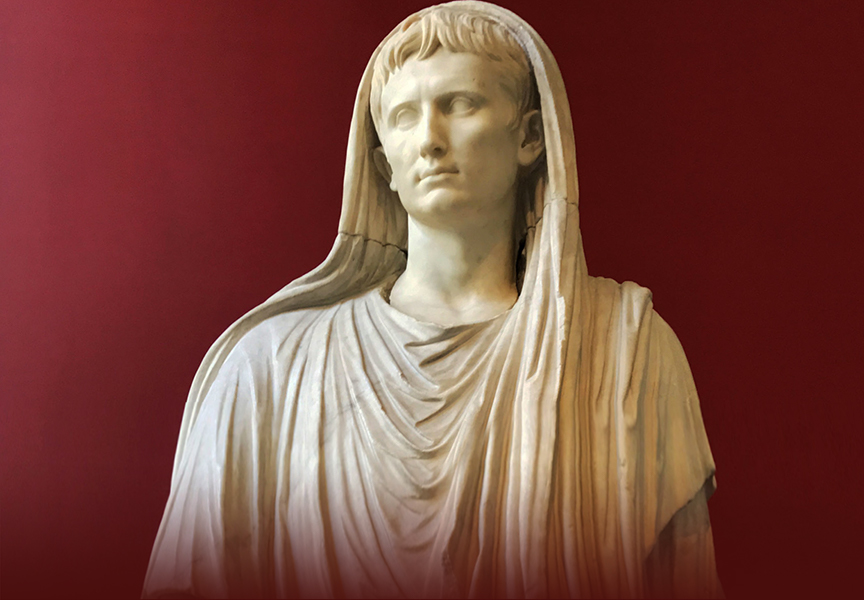
Today we’re discussing the principate. This is one-man rule by Augustus and his successors, so why do the Romans tolerate this if they hate kings so much? What do you think makes the principate continue to work even after rulers like Caligula and Nero? What do you think is good and bad for Rome and the empire about the principate?
Later on Christianity makes major headway through the empire despite persecution by several emperors, to the point where in the fourth century it is first officially protected and then made the official religion of the empire. What do you think most makes Christianity successful as a social force?
This is our last chance to collectively come to some conclusions about the Romans and the Roman idea, and about civilization in the ancient world as a whole. See you there!
Reviewing for the final exam
20 January 2022
I’ve updated the final exam page on the course website. On this page you’ll find information about the final and review materials. This is also where the final exam itself will be posted. The exam will be posted on Friday, January 21, after our last class, and must be posted to BlackBoard no later than Sunday, January 23.
There is a lot of material, but remember this course covers an entire regular 14-week semester.
The review sheet is not designed to be a list of answers so much as questions you can use to guide you toward the areas you want to focus on in your review. As you read through the questions on the review sheet, those you have a sense of how you might answer are lower priority for review than those questions you’re not sure how you would answer; those you’d then want to go back and spend some time reviewing in your notes, the readings, the videos, quiz notes, and class discussions.
Also note that the terms are a useful way of finding concepts you need to go back and review, so I’d advise stepping through the terms at the end of each topic and making sure you have a sense of what they mean and why we’re studying them.
To prepare for the essays, I suggest that you focus on what you would consider to be four or five of the major themes of this course, and think about possible questions that relate to those topics across the periods and transitions we’ve explored. For the essay you’ll be asked to give three examples, so you can sketch out a question about a recurring topic in the course, your perspective on that question, and three similar or contrasting examples of that demonstrate that perspective.
Please take a look at the review sheet for details on the exam’s content and structure. The Overview and Instructions video sets out my requirements and expectations. Once you’ve read through the review sheet and seen the video, if you have any questions about the exam or about any of the topics covered in it, please don’t hesitate to come to me.
To get to the final exam page, go to the course website and click on “Final” in the navigation index, or follow the link to the “Final Exam page” post on the Announcements page.
Welcome to Day 13!
20 January 2022
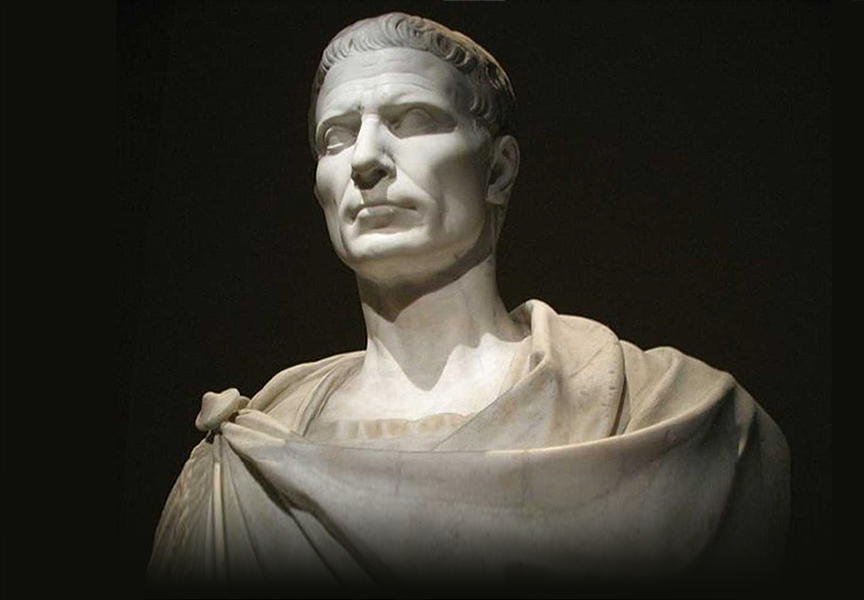
Today we’re talking about a series of massive turning points for the Roman Republic: the very different dictatorships of Sulla and Caesar, and the final collapse of the Republic, to be replaced by the one-man rule of Augustus.
What do you think Sulla was most interested in accomplishing? What is his legacy? What do we think of Pompey?
What was Caesar’s goal, for himself and for Rome, and why was he killed? All things considered, does he deserve praise as a great leader or censure as an ambitious seeker of power? What about Antony—he was the experienced lieutenant of Caesar, so why did he lost out to a kid who started with nothing but Caesar’s name?
What exactly is the principate? How is it that Rome, which was so intolerant of the idea of a king that the mere rumor he was angling to become king factored into Caesar’s assassination, accepted the one-man rule of Octavian, who came to be called Augustus? What made Augustus different from a king?
Looking forward to hearing your reactions to the above in our class meeting this morning. See you there!
Final exam and ultimate deadline
19 January 2022
Final exam. Only two more class meetings. You might be wondering about the Final. The final exam will be a set of questions posted on the site, for which you will submit your answers as a Word doc or PDF to BlackBoard.
The “Final” page on the site is now linked in the page heads (toward the right). If you go to that page, you’ll see the Overview/Instructions video and a couple of placeholders. The review sheet will be posted Thursday after class, and the Final itself will be posted Friday after class. The exam is due on Sunday, and since it is an exam it cannot be posted late. Any plagiarism whatsoever will result in a zero for the final.
Ultimate deadline. There is an ultimate deadline for this course. All late papers and resubmissions for reversible deductions must be posted to BlackBoard no later than Monday, January 24. I will post course grades on the website and on CUNYfirst on Tuesday (which is CUNY’s deadline for instructors posting grades).
Incompletes. I do not give incompletes unless they have been mutually agreed owing to extenuating circumstances before the ultimate deadline. Anyone not submitting the final exam will receive a WU.
Welcome to Day 12!
20 January 2022
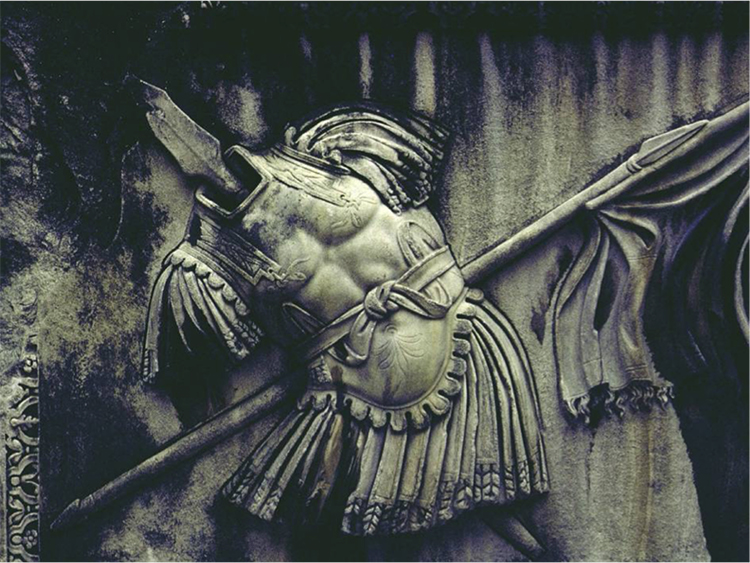
Today we’re talking about how and why the Romans shift toward military expansionism, and some of the repercussions that follow. Why do the Romans become militaristic and expansionist?
How do you think they see their rivalry with Carthage? Why do you think Hannibal is able to almost win—and why does he ultimately lose? Why does Rome seem to have such an off-hand approach to governing the territories it consumes or conquers?
Looking forward to discussing all this with you in our class meeting this morning. See you there!
Welcome to Day 11!
18 January 2022
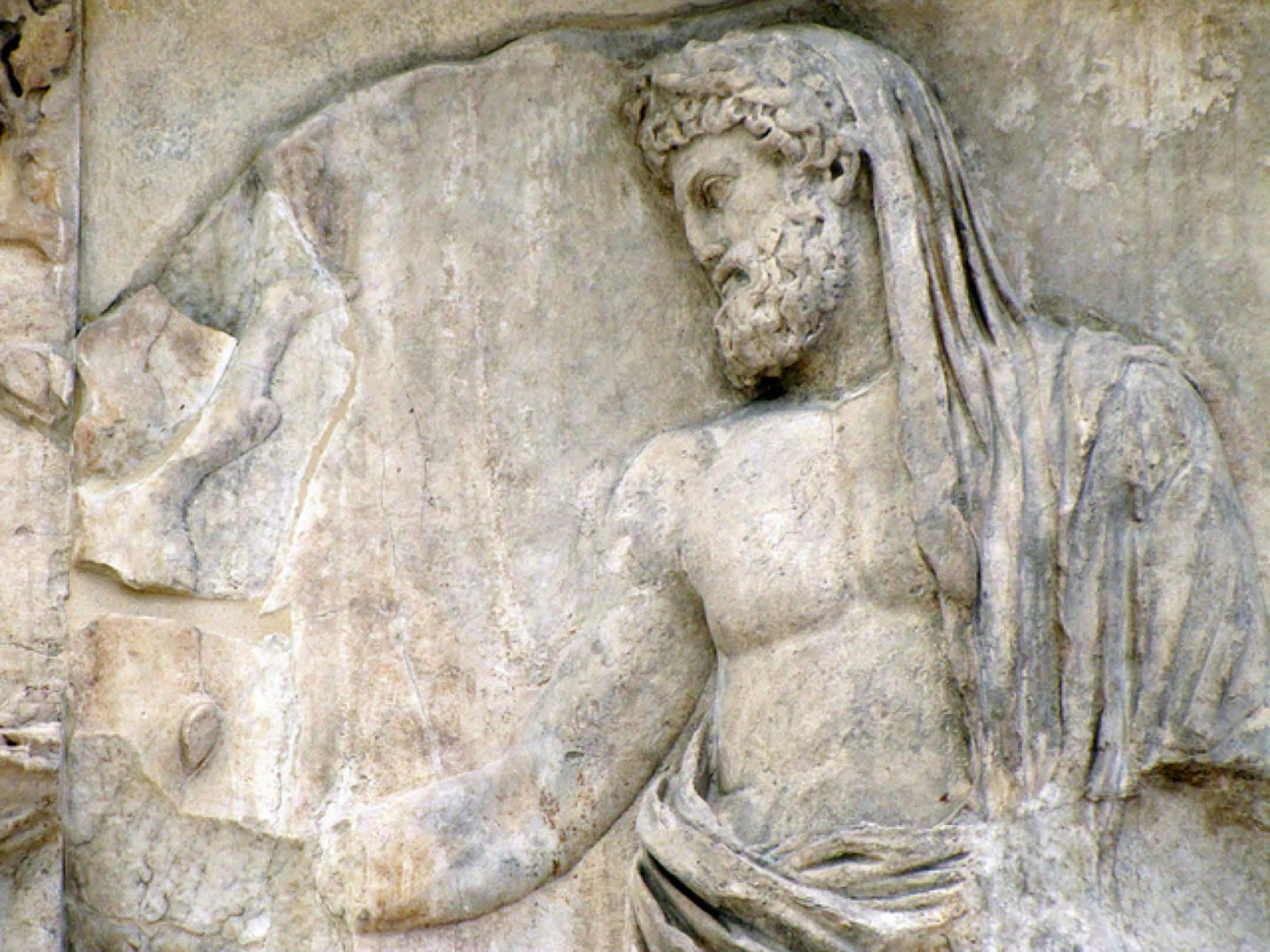
Today we’re starting our exploration of the Romans and their story. This is the beginning of the rise of the people that within a few centuries would dominate the entire Mediterranean, including most of the peoples we’ve studied.
At first Rome starts out as a city-state within the city-state culture of Latium with its own priest-king, just like the city-states in Sumer. But the Romans get fed up with the kings after a while and eject them from Rome. What do you think makes them turn against the kings? Is it just the actions of the kings, or does it go deeper? Why do you think the legends about the fall of the kings focus so much on the Rape of Lucretia as the thing that turns the Romans against the kings? What does the story of that rape signify to them?
The Romans replace the kings with a Republic. What stands out to you as the defining characteristics of the Republic? What does this idea mean to the Romans? The early history of the Republic involves an ongoing conflict between the patricians (families that control the priesthoods) and the plebeians (all other families of any class). Where does this conflict come from? Why are the priest-families so important to the Roman political system?
Looking forward to discussing all this in class this morning. See you there!
Gilgamesh essay grades and markups posted
17 January 2022
The grades and markups for the Gilgamesh essay are finally posted on the grading page. I apologize for the delay in getting these finished.
Overall I’m very pleased with the essays. There were a lot of interesting discussions and, this time, some unusual perspectives I don’t see often. Many of you really made the most of this opportunity to understand the values and ideal of a culture that lives four thousand years ago, and I’m gratified to see it.
Reversible deductions. Some of you may find that you received “reversible deductions” for issues relating to formatting and citations. The good news is, those are points that you can get back. Check the cover page of your markup to see if there are any hand-written points taken off next to the reversible deductions. If there are, I made notes on the cover sheet or in the essay about the issue, and included a handout with the requirements.
Please resubmit your essay to BlackBoard with those problems fixed, and I’ll be in a position to reverse those deductions. Only reversible deductions can be reversed, so don’t resubmit for anything other than reversible deductions.
Academic integrity. One student failed the first essay for engaging in plagiarism. Repeated instances of plagiarism will result in a student failing the course with the potential of further academic discipline by the College.
Missing essays. If you have not submitted your Gilgamesh essay, I strongly advise you to do so even though it is late. The lateness penalty is capped at 30 points maximum, and submitting an essay and getting a reduced grade is much, much better than a zero on the assignment for your overall course grade.
Clouds essay. Most of you are finishing up your Clouds essay. As you read, please consider the prompts and how what you read in the play as we go might shape what you have to say in your second essay. Be thinking about what other work will be effective as a comparison to Clouds. Make sure to watch the Essay #2 overview video if you have not done so.
Remember, just as the goal of the first essay was to better understand how people thought and interacted with each other in Bronze Age Sumer, with the Clouds essay your purpose is to use this play and the work with which you are comparing it to gain insights into the culture and values of fifth-century Athens. As always I am happy to discuss the play, comparison works, and the assignment.
Welcome to Day 10
14 January 2022

The Persian Wars are a huge watershed for the Greeks. Even the battles of this war remembered forever—Marathon, Thermopylae, Salamis. Why do you think the Greeks are really able to defeat the vastly more powerful Persians? How do you think the war changes them? What was most remarkable to you about the Persian Wars?
With the Peloponnesian Wars, the Greeks are fighting each other in a massive, generation-long slog unlike anything the ancient war has seen. Why? Why are they fighting, and why does it last for decade after decade? What is this war really about? Can we blame a particular city for this? Why do you think it turns out the way it does?
More wars between the Greeks opened them up to invasion by Macedon and the famous conquests of Alexander the Great. Why do you think the Greeks couldn’t maintain any real peace in during this era after the Peloponnesian War, even when danger loomed from the north? What were they really fighting about?
A big part of this story are the two Macedonian kings, Philip and Alexander. What do you think was most instrumental in Philip being able to take over Greece? Was his son, Alexander, really that “great”? Was his conquest a failure because it didn’t remain unified? What are Alexander’s legacies for the world?
The other thing I really wanted to do with you folks today is hash out what you guys think of Clouds now that we’re finishing it. There are some very striking scenes toward the end. What was most shocking or impactful for you—the debate where Unjust Argument wins (and: why does he win??); Pheidippides attacking his father; or Strepsiades abandoning rational discourse and taking up a torch?
What is this play about? What is Aristophanes telling us by having Strepsiades twist around so much? What do you think the play is telling us about classical Athens beyond what Aristophanes intended?
Looking forward to discussing all of this in class with you today. See you there.
Sera Janneh announcement and class meeting/assignment adjustments
13 January 2022

Lehman College has confirmed that one of the 17 fatalities in the Twin Parks North West fire on Sunday, January 9, named by the NYPD on Tuesday, was our winter session classmate, Sera Janneh. She was 27 years old and a psychology major in her sophomore year.
Sera was minoring in both early childhood/childhood and middle school/high school education, so it seems she was lost not only to family, friends, and loved ones but to future students as well. I’ve collected some of the reporting about Sera below. Her life was beautiful and the circumstances of her death heartbreaking.
Lehman College has set up a Twin Parks resources page for those affected by the fire. A list of organizations accepting donations for the families may also be found there.
Scheduling and assignment changes: Out of respect for Sera there will not be a class meeting or quiz today. The Day 9 readings and lectures are still necessary and remain in place as required assignments, and we will discuss the Peloponnesian War and the middle sections of Clouds on Friday alongside Friday’s topics. The quiz associated with Day 9 has been made optional and postponed to Day 10 as well.
Finally, owing to the disruption I have moved the deadline for the Clouds essay back two days, so that it will now be due by the end of day on Tuesday, January 18. (Note that there is no class meeting or assignment on Monday in recognition of Martin Luther King Jr. Day.)
• • •
The New York Times reports:
As smoke crept up to their sixth floor apartment, the Janneh family rushed into the stairwell, hoping to flee to safety. But as they ran down the smoke-choked staircase, one of them, Sera, 27, collapsed, her sister Mareama Janneh said.
Sera had been a student at Lehman College with an effervescent personality. Her family spent Tuesday arranging her funeral. A sister, Isatou Janneh, 18, remained hospitalized, still battling the effects of smoke inhalation.
Mareama said that Sera had been active in the Gambian Youth Organization, a Bronx-based nonprofit that focuses on youth leadership, where she helped distribute food to community members and helped organize the Ms. Gambia pageant.
Sera was studying to become a social worker because she believed “we needed more of that in our community, especially in the African community,” Ms. Janneh, 31, said. “She was just a good person to be around.”
On Tuesday, Breanna Elleston, 27, was mourning Sera, whom she described as having been her best friend since the two were students at the High School for Health Professions and Human Services in Manhattan.
“Every milestone that I’ve ever had in my life, she’s always been there for me,” Ms. Elleston said, choking back tears. The two enjoyed visiting museums, she said, and attending concerts by Sera’s favorite musicians, like Tyler the Creator, Playboi Carti and D’Angelo. “Even if it was hard, she would drop everything and be there for me.”
Above all, Sera was her cheerleader: When Ms. Elleston was displaced from her home by a fire last summer, she shared her harrowing experience on social media. Sera praised her for being so open. “You’re a soldier,” Sera wrote in a message Ms. Elleston shared. “The life transitions are so unimaginable but we’re still holding on.”
• • •
The Gothamist reports:
Janneh was an active member of the Gambian Youth Organization, which ran a food pantry and a youth mentoring program a few blocks from the building. Community members said she tried to escape her through the stairwell but was separated from other family members. She was remembered as a tireless worker who juggled multiple jobs, but still found time to volunteer with the GYO. She helped organize the group’s annual cultural pageant, where members of different Gambian tribes performed and competed.
“When I talk about her, tears come out from my eyes,” said Momodou Sawaneh, the founder of the Gambian Youth Organization. He described her as an “industrial woman, Somebody who has such a great life in front of her. We lost her for something that could have been prevented.”
Quiz #4 grades posted
12 January 2022
The grades and markups for Quiz #4 are posted. Once again I remind you to avail yourselves of the quiz notes (included in the markups and on the Print/PDF page) and especially the quiz recap videos, where I underline the key take-aways and things I think ae important. These should be useful both for your understanding of the topics and for your preparation for the final exam in a week and a half.
Welcome to Day 8!
12 January 2022
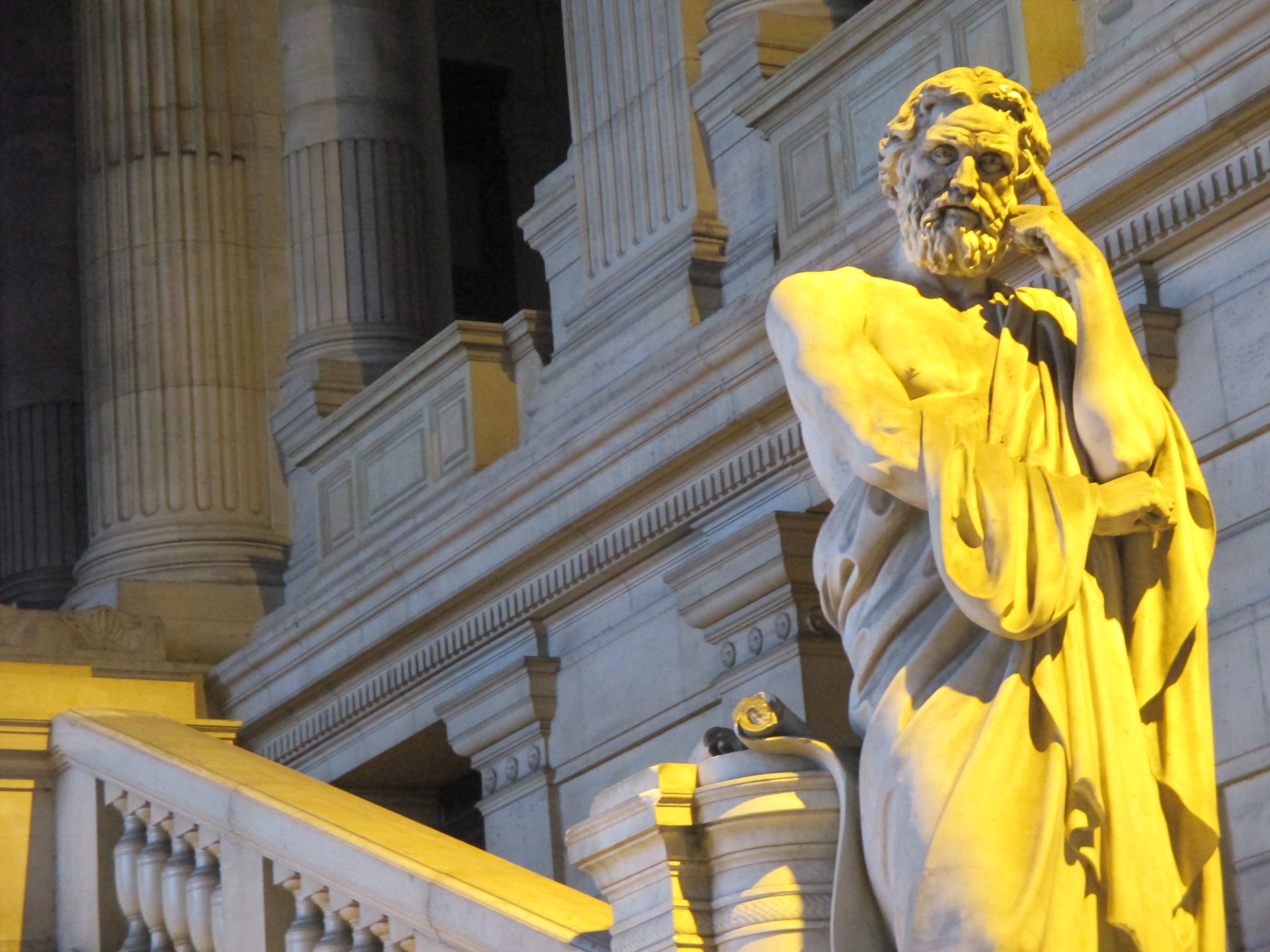
Today we’re talking about the period after the so-called Greek Dark Age, when from our perspective Hellas can be heard and seen again, with the foundations of Greek culture already laid down in the previous, unseen centuries. Two influential cities emerge in this period, both with opposing and increasingly extreme ideas of what it means to be Greek.
One is Sparta, a society dedicated to the art of war. What do you think goes into making the Spartans like this—so different, so focused on being warriors? What does being a warrior society mean to them? Why aren’t more poleis like this, especially given the other cities are so impressed by the Spartans’ dedication? Is the Spartan experiment a success, in Greek terms? What are the most positive aspects of the Spartan society in terms of the well-being of its citizens? What are the biggest drawbacks of the Spartan system?
We’re also covering the foundations of Athenian society. Culturally, Athens is the most important of the Greek poleis—just ask them!—but their story is like a fever dream, starting out as a tightly-managed oligarchy of a few privileged families and ending as Hellas’s only radical democracy. Why do you think Athens was so volatile? What is it about Athens that made them become so aggressive in seeking cultural dominance?
Today we’re starting our second primary source reading, Aristophanes’s comedy Clouds. It’s ribald, it’s provocative, and most of all it’s a call to arms. Why do you think the protagonist of this play is a confused old man? How does the playwright see the head of the Thinkery, the character called “Socrates”?
Looking forward to discussing all this with you in class. See you there!
Welcome to Day 7!
11 January 2022
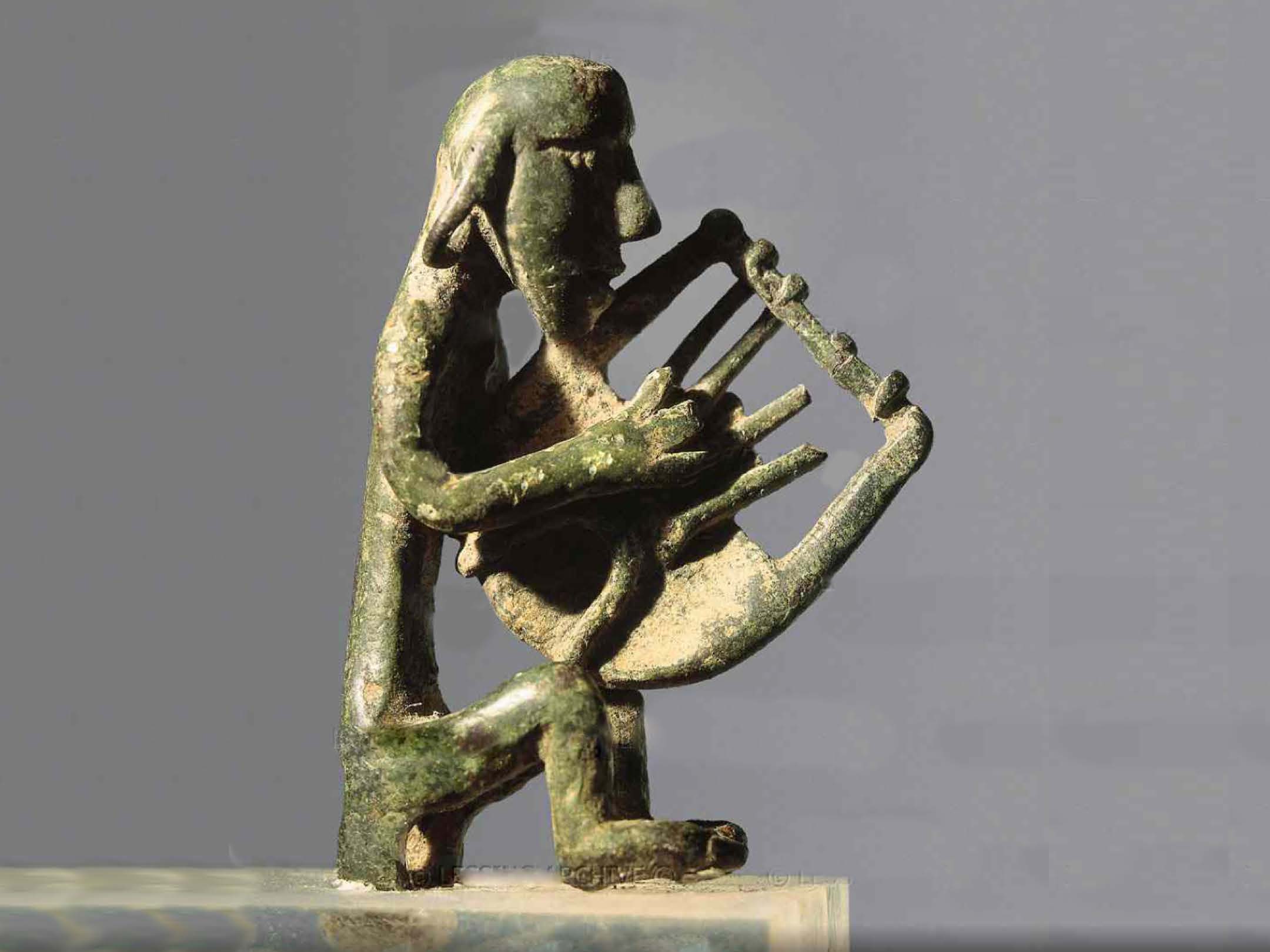
Today we’re talking about the so-called Greek Dark Age—the period during which the Greeks recovered from the collapse of the Bronze Age and built a new civilization.
The Greek Dark Age is frustrating and fascinating to historians of ancient Greece, because this period of rebirth, during which the foundations and chief elements of Hellas as we know it come into being, happens while the Greeks have no writing system and so there are no literature or records until the very end—we can’t hear them creating a new Greek society.
Our best evidence is Homer, the result of stories performed and passed down orally through these centuries and written down at the end, and we’re reading a few excerpts from Iliad and Odyssey—two works that are to become the starting point for all Greek education, both in Aegean and beyond.
From the reading and the videos, what do you think most drove the Greeks during the Dark Age? If the communities of the Aegean were so isolated and so fiercely independent, how did they end up having so much in common? How did they end up with such a clear idea of what it meant to be Greek?
—
This course focuses on the Mediterranean, but we’re talking a side trip to ancient Asia today as well. Why did the Greeks romanticize the Scythian barbarians? Is it a coincidence that the same kinds of things are happening in the Indus valley as are happening in Mesopotamia and along the Nile? What jumps out at you about the culture and religion of ancient South and East Asia?
Looking forward to discussing all this with you this morning. See you there!
Notes on Clouds and the second essay (due January 18)
10 January 2022
Now that we’re done with Gilgamesh, this week we’re reading instead a raunchy Greek comedy called Clouds and using it to get a feel for some of the things that people were passionate about in classical Athens. Make sure you have your copy and start in on the reading as soon as you can. Because it’s a comedy, there will be jokes—some of which would have made more sense to the Athenians than to us. Make sure you read the introduction to the play and that you read the line-by-line notes of whatever version you have. (That’s why I don’t recommend using just a bare transcription off the internet—it’s really important to have the notes.)
As before, there is an essay due Sunday. The prompts are on the course website, and there is an overview video which is VERY IMPORTANT. The key thing for the Clouds essay is that you need to compare Clouds to a second work, so you will need to block out time not only for reading Clouds but also looking through the other work, as well as preparing, writing, and reviewing the essay itself. Come to me with any questions—but please watch the video first.
Any missing Gilgamesh essays, please get them in as soon as you can. Even with the lateness penalty, in terms of your course grade you’re better off with some kind of grade than you are not turning it in and getting no points.
Welcome to Day 6!
10 January 2022
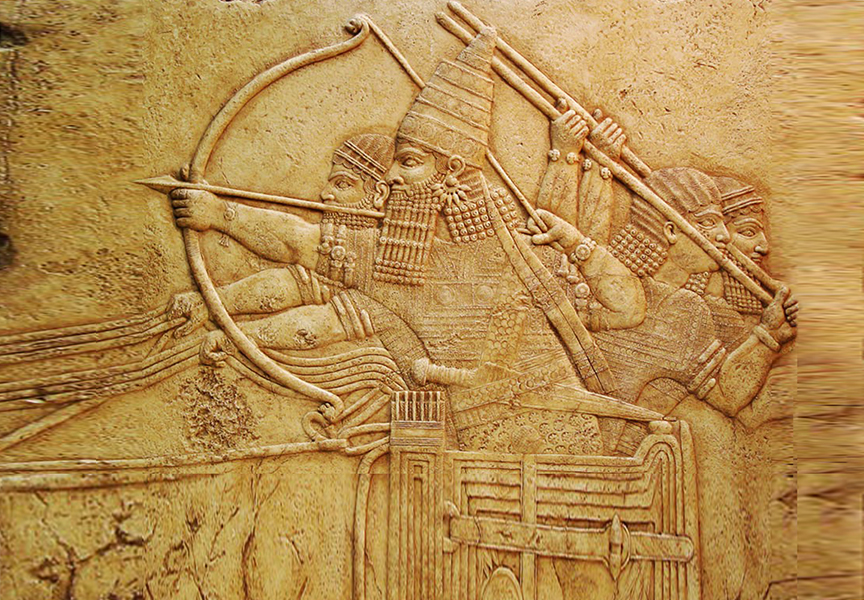
Today we’re talking about two very different empires in the same part of the world: the Iron Age Assyrians, also known as the Neo-Assyrians, and the Persians. Was the Neo-Assyrian empire really a failure? What went wrong, and why did it come apart so catastrophically?
Did the Neo-Assyrians and the Persians have anything in common apart from being empires? What do you think were the most important keys to the success of the Persian empire a century or so later?
Looking forward to discussing all this with you in class this morning. See you then!
Welcome to Day 5!
7 January 2022
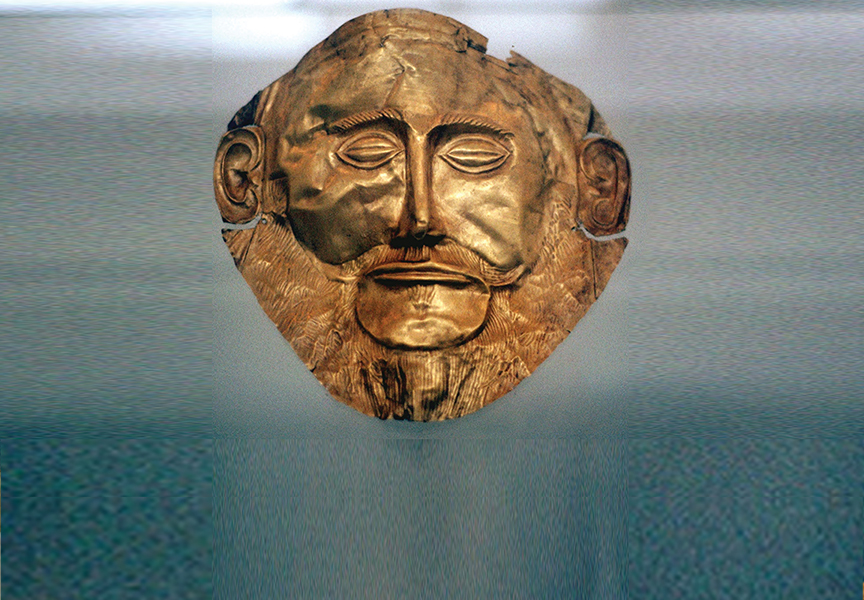
Today we’re talking about the Bronze Age Aegean: the indigenous inhabitants, especially the mysterious Minoans, and the invading Greeks, who swarm in from the north and take over the Aegean world before bringing about their own spectacular collapse, bringing down the whole Bronze Age with them.
There are a lot of things to talk about here. What strikes you as most intriguing about the Minoans—what we know of them? Why do you think the Mycenaean Greeks were so successful in surpassing them? If you were to talk about what was important to the Minoans and to the Mycenaean Greeks, what would be similar, and what would be distinctive? Were the Mycenaean Greeks their own worst enemy in too-greedily building a trade empire, or should we emphasize other factors in the great cataclysmic collapse of the Bronze Age and its civilizations?
We’re also talking about the dawn of the Iron Age, which we see first in Canaan—now that it’s not being warred over by the surrounding Bronze Age empires, the lands along the eastern shores of the Mediterranean are free to develop their own strength and economic reach. And they’re very characteristic of how the Iron Age differs from the Bronze Age. We’re focusing on three very distinct peoples who are rivals for land and independence in early Iron Age Canaan: the Phoenicians, the Philistines, and the Hebrews.
Why is the Iron Age so different, do you think? Why does a shift to iron matter so much? What do you think most sets apart a trade empire like that of the Phoenicians from the empires of the Bronze Age we discussed? What do you think are the biggest factors in the Hebrews being able to create their own state in Canaan despite huge disadvantages? How does religion factor into the story?
Looking forward to hashing all this out with you in class today. See you then!
Important notes on Essay #1 (due January 9)
6 Januart 2022
Here are a few brief reminders about the Gilgamesh essay, which is due very soon on Sunday, January 9.
- Watch the video. Make sure to watch the overview video, since that tells you exactly what I am looking for. It’s on the Essay #1 page on the course website.
- Thesis statement. Make sure you have an introduction with a thesis statement (your argument asserting your position on the question/problem being addressed) and a body that described and discusses three examples from the Epic supporting your thesis statement. For models and explanations on how to do this, see “Writing a Position Paper” (a.k.a. “The Elephant Pamphlet”), which is on the Resources page on the website.
- Sources. For your examples you may use all of Gilgamesh, including the tablets that were not assigned if they contain helpful support for your thesis. You do not need to use other sources for this assignment; this essay is about your interpretation of Sumerian culture as represented in the beliefs, actions, and relations of the characters in the Epic.
- Requirements for all papers. You must adhere to the requirements for all papers (listed on the Essay Musts page on the course website). Not meeting the requirements for all papers will mean a lower grade.
- Template. There is an MS Word template already set up with some of the formatting I require on the Resources page. If you use Word I strongly recommend making use of this template. There is also a Google Docs version of the template posted there as well.
- Late papers. As per the syllabus, late papers are marked down by ten points per class meeting, up to a cap of thirty points. Avoid this penalty and block out the time you need to prepare, write, and review your essay so that it can be submitted on time.
- BlackBoard. All essays are uploaded to BlackBoard. Look for “Upload Assignments Here” in the left-hand menu. Your essay needs to be uploaded as a Word (preferred) or PDF file attachment, not pasted in as text submission. If you use a browser-based word processor, you’ll need to download or export to a Word document and upload that.
I’m happy to discuss any aspects of the Epic or the essay, so please come to me if there’s anything you’re not sure about. I’m looking forward to hearing your interactions with the folks of Uruk!
Welcome to Day 4!
6 January 2022
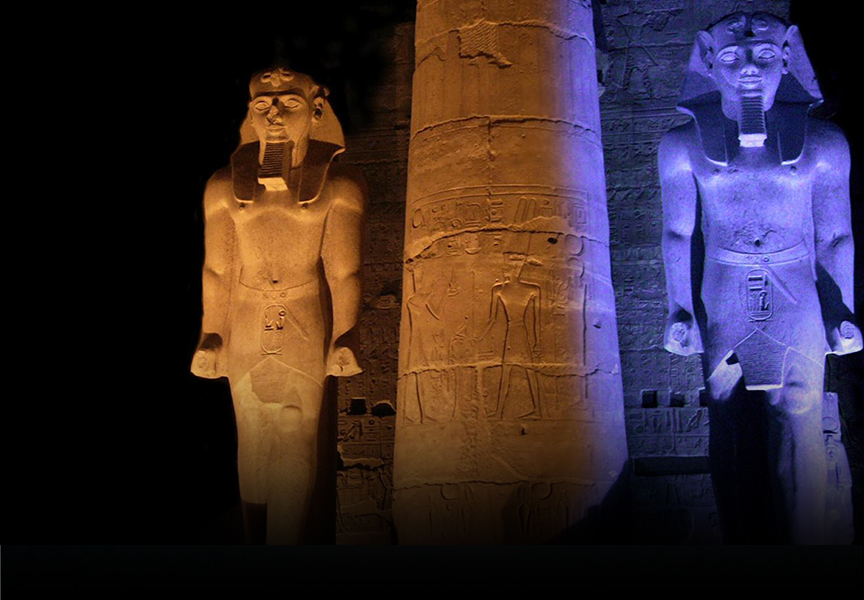
Today we’re talking about Egypt! This is a society that emerges around the same time as Sumer, and yet they could not be more different. Ancient Egypt has fascinated and perplexed students of history for thousands of years. What stands out the most to you about Egyptian society and culture? This is one of those rare cultures where absolute monarchy remains stable and effective for century on century. Why is that? What do you think makes the role of the pharaoh work without abuse of power? What do you think are the most important values and beliefs to an Egyptian? How does this affect the way they think about the gods? How does it affect how they think about death? How is Egypt during the New Kingdom different from the Old Kingdom?
It’s striking how different Sumer is from Egypt. What do you think goes into making them so opposite to each other? Egypt unified early. Why was it possible there, and not in Sumer, where the city-states remained fiercely independent? What’s most different about their views of the gods, of kings, of death?
Today we also read the last two assigned tablets of Gilgamesh. The most obvious question is, why does he fail in his quest? What is the author trying to get across when he talks about Utanapshtim on the edge of the world, and the tests Gilgamesh is subjected to? How is Gilgamesh changed at the end of the quest, and what do you think he sees when he calls the boatman’s attention to the walls of Uruk at the very end?
Looking forward to discussing all this with you in class this morning. See you there!
Welcome to Day 3!
5 January 2022
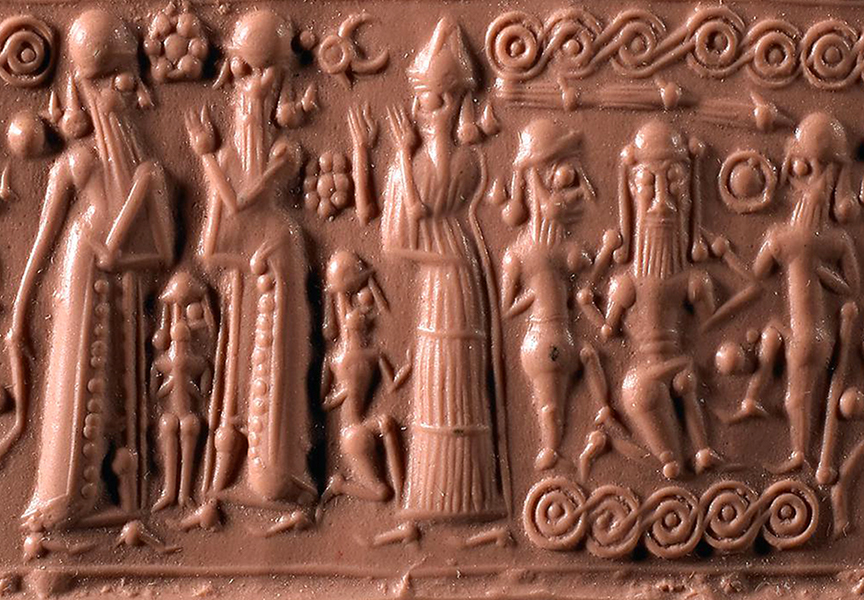
Today we’re talking about the civilizations of Mesopotamia, the land between the rivers: the original inhabitants in Sumer to the south, and the alien newcomers, the Semitic tribes that settle in Akkad, Babylon, and Assyria. They’re the strangers with their own languages and cultures who start to emulate, and, later, absorb the great cities and culture of the Sumerians.
In the discussion today I want to talk about lots of things. One is how different the Sumerians and the Semitic peoples were—why did they build Sumer-style city-states, even down to the ziggurats for their own gods, and end up adopting Sumerian technology? Why do you think the Sumerians didn’t survive? When Sargon of Akkad built an empire, what was his power based on, and why didn’t it last very long after he died? Why do you think so much significance is attached to the Code of Hammurabi?
Today we’re also looking at tablets 5 and 6 of Gilgamesh—the fights with Humbaba, the forest guardian, and the bull of heaven. What jumps out at you most from these two tablets? Why do Gilgamesh and Enkidu go on this quest? Is it just about glory, or is there more to it? What do you think is the symbolism in Gilgamesh and Enkidu attacking the guardian of the cedar forest? Note what happens to the cedar, too—what can we say about that? And what about the way Enkidu and Gilgamesh interact in these tablets? What’s that telling us about these two? Why do the gods agree to send the bull and to punish Enkidu, when they were the ones that created Enkidu in the first place?
Looking forward to discussing all of this with you in class this morning. See you there!
Welcome to Day 2!
4 January 2022
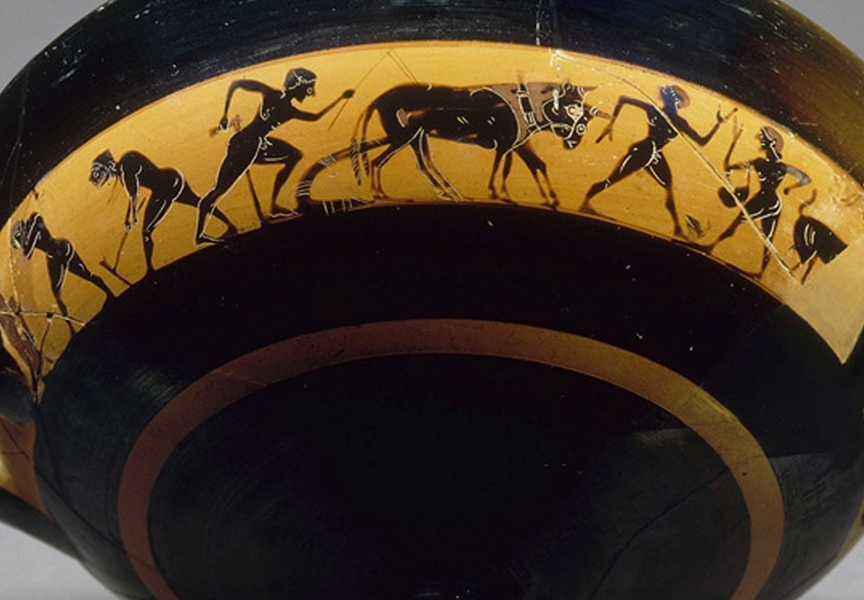
Today we’re talking about what’s involved in creating civilization. I think of civilization as a technology—something that’s a product of human ingenuity and that’s designed to produce a benefit. So, what are those benefits, and what’s the cost? Why do the ancients make this wrenching change? What strikes you as the most important ingredient into making a civilization?
We’re also reading the first two tablets of The Epic of Gilgamesh. (Make sure to read at least pages xiii-xvi and xxxi-xxxii of the introduction if you haven’t already—it really helps to have the background. And watch the video on the epic posted with today’s video lectures.) What got your attention the most in these two tablets? There are a lot of questions we can talk about, but the biggest two are: What specifically does Gilgamesh do to anger the people—why do these two things make him a bad king? And, even more intriguing: why on Earth do the gods respond to the anguished prayers of the people about Gilgamesh by creating the beast-man Enkidu?
Looking forward to discussing this with you in our class meeting this morning. See you then!
Welcome to Day 1!
3 January 2022
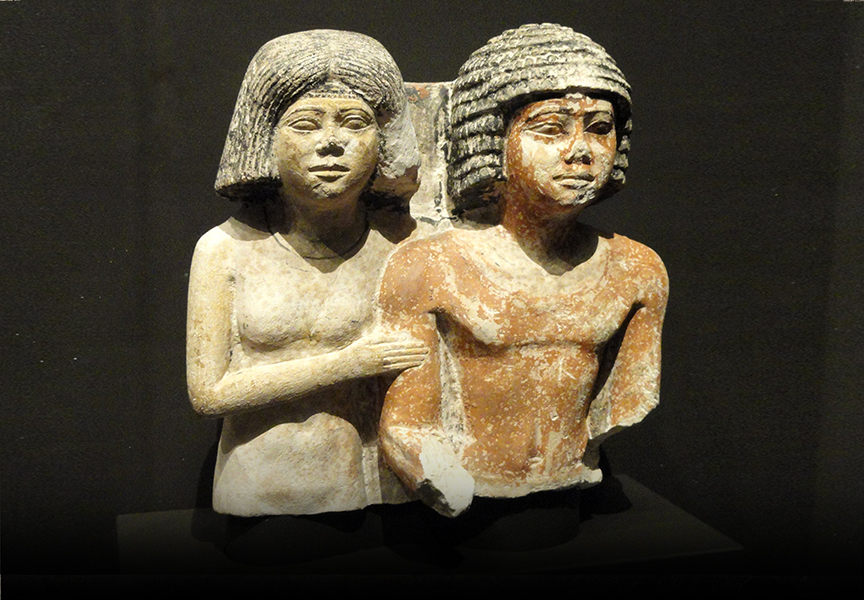
Welcome to Day 1! I know we’re, again, just starting, but I’d love for everyone to post about what you’re hoping to explore, what cultures from the ancient world you find interesting or want to know more about, things about the ancient world you want to look into and understand better—that kind of thing.
You can also talk about how other courses and experiences you’ve had might impact on the stuff we’re talking about here. Make sure to read over the other students’ responses and respond to the ones you thought were interesting. Go back to the page later and see what was posted after you did. Posting is part of your grade, but it’s also how we can make sense of the stuff we’re exploring together.
Make sure your Disqus account is set up
2 January 2022
As noted in the previous emails and in the course overview video, we are not using Zoom but meeting textually using Disqus. That means that for tomorrow’s discussion (in the Day 1 discussion area on my website), you’ll need a Disqus account. I’d suggest making sure you have your account set up today so you know it works.
You can go to the Disqus testing page to see if your Disqus account is set up.
If you click in the box that says “Join the discussion” and there’s a button at the bottom right that says “Post as [Your name]”, you have a Disqus account. If not, find where it says “Log in with” and either create a Disqus account or use your existing Facebook, Google, or Twitter accounts. You can also create a Disqus account directly on the Disqus website.
Welcome to Week 1!
2 January 2022
Welcome to Week 1 of Civilizations of the Ancient World (Winter Session)! This week we’re going to be exploring the invention of civilization as a sort of social technology, and touring the great, and very different, cultures of the Bronze Age—Sumer, Egypt, Assyria, Babylon, Minoan Crete, and Mycenaean Greece—as contrasting experiments in the relationship between the individual and the community, between the mortal and the divine, between the masculine and the feminine, and between local identity and empire. We’ll also be reading parts of the Epic of Gilgamesh, giving 4,500-year-old voices a chance to tell us directly exactly what mattered to them and to a unique and ancient people.
Our meetings: As you know we will be meeting every weekday at 9:30. Our meetings will be in the textual discussion area on each day’s page on the course website. Two things are vitally important for this course to work:
- That you come to the meeting every day on time and prepared, having done all the readings, watched all the videos, and thought about what those readings and videos tell us about those times and places; and
- That in these meetings we all talk through what we reacted to and what things seem to us to be most important about how we understand them, and thrash out together in discussion what it all means. Our class discussions are just that, and everyone participating in them is both vital and the most direct path to gaining a real grasp on what it’s like to be a part of these particular communities thousands of years ago. The readings and lectures provide the basics, but interpretation through discussion is literally how the study of history actually works.
The first essay: The essay on Gilgamesh is due by Sunday night on the 9th, a week from now. The prompts are on the website (under Essays). I strongly advise you as you read the Epic this week to bear in mind the prompts for the essay and think about what you might want to write. Ask questions about Gilgamesh in our class discussions and talk about what you think it means as we look at each assigned tablet. Block out time to write the essay and to review it once it’s had a chance to marinate in your mind. Don’t forget that there is an overview video on the essay page that you need to watch, since it tells you exactly what I’m looking for for the essay.
This course goes by really quickly, but you wouldn’t be here if you weren’t game for a challenge. Dive in, and always as me any questions you have, by email or in class. Don’t wait to talk to me if you’re curious about something or something’s not making sense or you’re having problems. I’ll try to respond as quickly and as helpfully as I can.
Let’s get started on our exploration of the worlds that created ours!
Read now: Getting ready for Monday!
30 December 2022
Our Winter Session course, Civilizations of the Ancient World, starts on Monday and I’m looking forward to it. Here are a few pointers to make sure you’re prepared:
- First, make sure you have enough time blocked out over the next month. This is a dense enough course already when it’s taken during a full 15-week semester, and here it’s been compressed into three very short weeks. That means that you’ll have a week’s worth of work every weekday between now and the 23rd. Make sure you’ve blocked out time every day for the video lectures, the textbook and primary source readings, the class discussions, the online quizzes, and the written assignments. All of those will be a critical part of the course and integral to your course grade. There’s no time in a course like this to fall behind and catch up, so advance planning really is the key.
- Make sure you’ve watched the quick welcome and orientation video. It’s only a few minutes and tells you the most important aspects of how the course works. It’s on the front page of the website and is also directly linked below.
- Our first meeting will be on Monday at 9:30 a.m. in the discussion area.
- It’s important that everyone come to the meetings having done the readings and watched the videos so that we can discuss them and make sense of what was really going on in that time and place. Please make sure to block your time so that you’re going into every meeting prepared, having done all the readings and the videos. This is truly one of the most critical aspects of approaching this course, so please bear this strongly in mind.
- As you can see in the welcome video, our discussions will be text-based rather than interactive video. You’ll need to create a Disqus account if you don’t have one. Before the meeting, please go to the Disqus Test Page on my site to make sure you have a working account and can join in the discussion. The discussions are a substantial part of your grade, so you want to make sure you can join in. The test page is linked below, and you can also access it using the checkmark button at the top right of the Day 1 discussion area.
- Do I have the right email for you? Things move quickly in a Winter course and I need to be able to contact you and issue general updates. If this is not the best email for you, please let me know!
- Look ahead to how the course is going to go and email me with any questions at all.
Looking forward to meeting up with you on Monday and exploring the ancient world together. See you then!
Welcome to Civilizations of the Ancient World (Winter 2022)
16 November 2021
Hi folks,
I’m looking forward to a great semester exploring the cultures and transformations of ancient societies, from “prehistory” to the rise of the Roman Empire.
For the Winter semester, the course will be entirely online. This is an intensive Winter Session course, which means we have three weeks to cover material normally explored over the course of three months. We meet online every morning Monday through Friday for textual discussion, and there are daily readings, video lectures, and quizzes as well as weekly written assignments. If you’re not in a position to devote a serious amount of time to this course EVERY DAY between January 3 and 23, you should reconsider. It is also not generally recommended to take more than one winter session course at once.
Right now, I need you to do three things.
First, look over the course web page on my website, which will be our base of operations starting at the beginning of January. Watch the quick welcome and orientation video. Look through each of the pages on the website to see how the course will work, and make sure to click through to the weekly schedule pages to see how the readings, videos, and online discussions are set up. Any questions about how it works, please send me an email.
Second, GET THE BOOKS NOW if you can. A lot of you will be ordering books online, and you need to make sure you have the books and are ready to go when the course starts on January 3. On the “Books” page I’ve tried to give you lots of different options for getting what you need, but consider ordering now if there’s going to be any kind of shipping involved. (If you come across a legitimate online/e-text version of one of the assigned readings that’s not already listed, please let me know.)
Finally, please reply to my email (or email me) so that I know I have a working email address for you. You can just reply, reply and say “hi”, or reply with a question or concern, but I want to make sure I can contact everyone (and my usual method of handing out cards to fill in on the first day obviously won’t work in this format). If you receive this email but there is an email address you prefer I use instead of this one, please definitely reply and tell me that.
Email me anytime with questions. I’m looking forward to starting our journey together.
Make sure you’re getting my emails
1 November 2021
If you haven’t been getting my emails, that means I don’t have a good email address for you (or they’re going into your junk folder). If this is the case, please email me and let me know what address I should use to reach you.